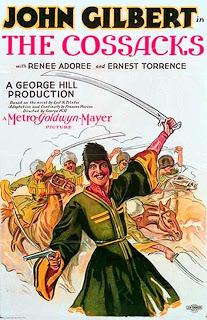
Directed By: George W. Hill
Starring: John Gilbert, Renée Adorée, Ernest Torrence
Tag line: "Stirring romance, hard riding, desperate fighting with the Cossacks playing their game of war and chivalry"
Trivia: The film was originally to have been directed by Viktor Tourjansky, but it took such a long time getting the script together that he moved on to another project.
The story of actor John Gilbert is a tragic one. A star during the silent era whose popularity rivaled that of Rudolph Valentino, Gilbert had a tempestuous relationship with MGM studio head Louis B. Mayer (the two allegedly detested one another), and as a result, he was assigned to a series of low-grade pictures. By the time he completed his 6-film contract with MGM, Gilbert was all but forgotten by the movie-going public. Greta Garbo, who was once engaged to Gilbert, tried to rescue his career by getting him a role in 1933’s Queen Christina, but it was too late. Suffering from depression and alcoholism, John Gilbert died of a heart attack at the age of 36 on January 9, 1936.
To see him in 1928’s The Cossacks is to realize just how talented John Gilbert was, and while the movie itself hasn’t aged well, its star shines brightly throughout it.
For the Cossacks of Southern Russia, life hasn’t changed in centuries: the women still stay home and work while the men ride into battle against their enemy, the Turks. It is said that all true Cossack men love the smell of blood, the glory of war, but Lukashka (Gilbert), the son of the Cossack Chieftain Ivan (Ernest Torrence), sees things differently, and would rather stay with the women then fight with the men.
Lukashka’s views make him very unpopular, and even his childhood sweetheart Maryana (Renée Adorée) wants nothing to do with him anymore. A free spirit, Lukashka doesn’t mind the constant barrage of insults. That is, until the night two drunken Cossacks grab him, put him in a ladies dress, and tie him to a pole in the village square. Taunted by the women (including Maryana), an embarrassed Lukashka is eventually set free, and still fuming over the incident he gets into a fistfight with his father, then helps track down a group of Turkish prisoners trying to escape (during the ensuing chase, he kills his first man).
Hailed as a hero for his role in recapturing the prisoners, Lukashka (realizing he does, indeed, enjoy the thrill of battle) goes on to become the bravest warrior of them all. Yet despite his new outlook, he refuses to forgive Maryana for turning against him. Then, fate intervenes; while Lukashka and the other men are off fighting the Turks, Prince Olenin Stieshneff (Nils Asher), the son of the Czar, pays a visit to the Cossack village. Instructed by his father to marry a Cossack girl, the Prince sets his sights on the beautiful Maryana. At first, she rebuffs the Prince’s advances, but when Lukashka once again scorns her, a humiliated Maryana agrees to the marriage, all the while hoping her true love will eventually come to his senses.
Even for a movie made in 1928, The Cossacks seems terribly old-fashioned; as the film opens, Ivan and his men are returning home from war. To celebrate their victory, they head straight to the local bar and drink as much vodka as they can get their hands on. The debauchery is interrupted, however, by the ringing of the church’s bells, at which point the men stop the party in its tracks and head outside, kneeling down on one knee until the bells stop clanging (because, as we’re reminded several times throughout the movie, “above all, there is God”). In addition, there are aspects of the story, especially early on, that won’t sit well with modern viewers. Lukashka is called a “woman-man” for refusing to fight, and his disgruntled father declares that he doesn’t have a son (“I have a daughter with a fine nose”, he says). Some of the insults tossed at Lukashka don’t even make sense; when he tries to cozy up to Maryana in a field, she pushes him away, calling him a “chewer of sunflower seeds”!
Its questionable dialog aside, The Cossacks is, at times, a thrilling adventure film, and features a number of memorable scenes (including a torture sequence towards the end that’s hard to watch). Rising above it all, though, is star John Gilbert; whether playing a pacifist or a fierce soldier, Gilbert’s charismatic performance ensures that his Lukashka is always the movie’s most interesting character, and we root for him even when he seems to have lost his way (at one point, Lukashka tries to hurt Maryana, who is anxious to win him back, by kissing a Gypsy woman in front of her).
Without John Gilbert, The Cossacks still would have been a mildly diverting adventure. With him, it became something more substantial, and serves as a reminder of what it was that Hollywood lost when John Gilbert was allowed to fade away.
